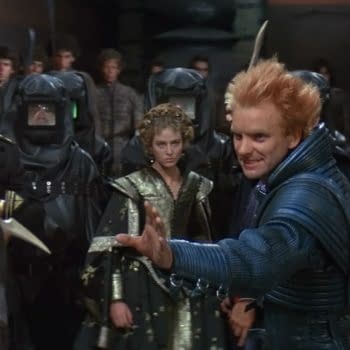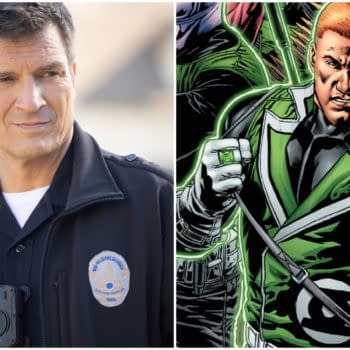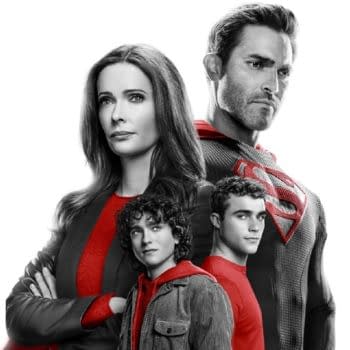Posted in: Movies, Netflix, Netflix, Review, TV | Tagged: dark mirror, HRL, netflix, recap, Review, star trek, tv
Black Mirror Outdoes Both Star Trek and The Orville with USS Callister
Over its prior three seasons, the British Channel 4 anthology series-turned-Netflix darling Black Mirror has had episodes ranging from ho-hum to outstanding. As the fourth season approached, there was the typical pondering if the series still had fresh ideas to tackle or if it would be on the wane. Now that it's arrived and the entire six-episode season ready for binge watching, we've had a chance to dig in.
Rather than choosing to pace itself, its opening episode, USS Callister, written by series creator Charlie Brooker and William Bridges, does something we never particularly expected: it takes a Twilight Zone-style series and creates one of the most memorable Star Trek episodes since The Trouble With Tribbles hit screens 50 years ago.
There's no particular way to expect the rest of the season to resonate as strongly (but we've got high hopes now), but no matter that, turning a faux-Trek setup and turning it into a horror-thriller is no mean feat. Starring Fargo's season 2 lead Jesse Plemons as Robert Daly. Daly is a programming whiz who is one half of the owning team of virtual reality company Callister, named after their version of Star Trek (here called Space Fleet), which had aired several decades earlier. It's Daly's devotion to the old series that drove him to creating a full-consciousness virtual reality world. It's going gangbusters and the company is pushing hard to have its latest release ready in time for Christmas.
Daly has his own instance of the simulation running at home, which we find "Space Commander Daly" sitting in the captain's chair. He and his crew are battling against an alien ship before he finally outwits it and comes out victorious. It's all played entirely over the top. His bridge crew all behave as if they worship him, call for three cheers, and kneel before him in adoration. He plays up a Shatner-esque style captain, but dialed up to 11. Next we find him in the real world, very much the meek and timid programmer on his way into the office. We recognize his bridge crew as people from around the office (the receptionist, Elena, played by Milanka Brooks; a coworker, Shania, played by Michaela Coel; the intern, Nate, played by Osy Ikhile; and the CEO James Walton, played by Jimmi Simpson).
None of this really rings much of an alarm bell, since it would be logical enough to use real people as the basis for in-game characters. A newly hired programmer, Nanette (played by Cristin Milioti) also is adorable with her playing Daly's biggest fan. It turns out she joined the company for the chance to work with him and his groundbreaking VR software.
It's not long before the vibe shifts from a cheesy-fun holodeck scenario story to sensing that something is going on behind the scenes that's not quite so benevolent.
The themes in the episode revolve around temptations of power and godhood (which when a programmer gets to run around roughshod within their own virtual reality creation, it's pretty much what they are). Then there are the effects of bullying, and how the bullied will very often themselves wind up sociopaths in their own right. The elements that Daly chooses to include in his simulation (like alcohol) versus those which he edits out (like genitalia) speak volumes to his own level of emotional development.
The set is an amalgamation of the various areas on the Enterprise — there's the bridge, the transporter room, ten-forward; and the shorthand works. Instead of Starfleet, they're all officers in Space Fleet. The delta off of Original Series episodes is actually far closer than either The Orville or Star Trek: Discovery. His simulation captures the '60s-era kitsch to a T, from the fashions and super-saturated colors, to the general interactions and how which button is pressed doesn't really matter, they all do the same thing — which means they do whatever's needed to advance the scenario's storyline.
It's a colorful and cheery veneer over what's effectively a prison, and one where its participants can do nothing until the local god decides it's time to play.
Not a should-see — this one is a must-see.









!['Rocketman' Soars With Warts and All Elton John Story [Review]](https://mlpnk72yciwc.i.optimole.com/cqhiHLc.IIZS~2ef73/w:350/h:350/q:75/rt:fill/g:ce/https://bleedingcool.com/wp-content/uploads/2019/01/rocketman.3-350x350.jpg)


!['Aladdin' Gets its Wish of Being Enjoyable, Even if it Can't Escape its Origins [Review]](https://mlpnk72yciwc.i.optimole.com/cqhiHLc.IIZS~2ef73/w:350/h:350/q:75/rt:fill/g:ce/https://bleedingcool.com/wp-content/uploads/2019/05/aladdin.genie_-350x350.jpg)










